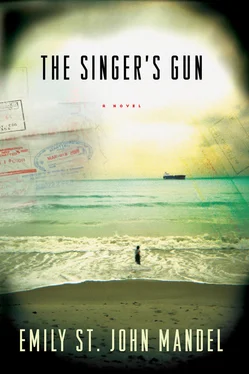“Your downstairs neighbor.”
“Blythe. She must’ve been in her fifties. Lived alone, dunno if she was ever married or had kids. I never heard anyone come by to see her. She never went out except to go to work, this insurance office down the street. She listened to talk radio all day on the weekends, so there was always voices coming from her place, and I’d hear them all day long. When I first moved into the place it drove me crazy, I mean, this woman’s radio was never off, but then after a while I didn’t mind anymore. It was nice, I mean, I lived alone too, and always hearing someone talking, it makes you less alone.” She blinked and sipped at her coffee again. “What about you? Were you born here?” He realized that she must have very few friends in this city.
“Albany,” he lied. His hands were sweating. The lunch-hour crowd was thinning out. He wished she’d stop talking and ask for the card. He was wearing reflective dark glasses that made her look like a ghost across the banquette.
“Is Gabriel your real name, then?”
“Of course,” Anton said. He had thought up the alias with great difficulty.
“How old are you, anyway?”
“Twenty.”
“Twenty,” she repeated. “Twenty.”
“Yeah. Um, think of flight school.” He could see the doubt in her eyes. He tried to look as serious as possible, in an effort to appear somewhat older than eighteen. “I mean seriously, whatever my name is or how old I actually am, think how much easier it will be with a Social Security number.”
“I could get in without one,” she said. “I did the research.”
“Still,” he said, “I can’t help but think it might be easier if the question didn’t come up, don’t you?”
She looked at him flatly for a moment and then sighed. “Christ,” she said. “Okay. How do we do this?”
He leaned toward her over the table; she leaned close, and he was pleasantly surprised to discover that her breath smelled of licorice. “Give me the envelope,” he said very softly. “There’s only one bathroom here, and I’m going to go in there and count the money while you go up to the counter to pay for your coffee, and then I’m going to leave. If the count was correct, then when you go in there after me your card will be taped to the back of the toilet tank.”
“Like in that Godfather movie with the gun,” she said. “I like that.”
In the bathroom he counted the money and put it in his wallet. From his wallet he took out the Social Security card, double-checked the name on it and put it in the envelope. There was condensation on the toilet tank, a cold porcelain sweat. He tried four times, but the tape he’d brought with him wouldn’t stick; the envelope kept falling, the tape kept coming away wet and glueless. He was at a loss for a moment until he remembered the gum. He found the last stick in his pocket and chewed rapidly, contemplating the toilet, then stuck the gum to the back of the tank, stuck the envelope to the gum, and opened the bathroom door half-expecting a SWAT team. The girl was paying at the counter. He walked out behind her back and away down the street in the opposite direction of home, his heart pounding. It was a mile before he doubled back toward the Williamsburg Bridge and his parents’ store. He took a circuitous route home amid the warehouses.
“It’s messy,” Aria said. “I don’t like it.” They were sitting together on the loading dock at the end of the day. The metal loading dock was still warm from the sunlight but a cool breeze was blowing in off the river.
“What’s messy about it?” Anton was feeling a little defensive about the Godfather technique.
“Anyone could walk into the bathroom and grab the card before she does. Just come up with a better idea.”
“What if I can’t?”
“You got straight A’s in high school,” she said, and muttered something in Spanish under her breath.
The solution came to him when he was out with Aria and his parents for someone’s birthday, his mother’s perhaps, at a restaurant in Chelsea. Anton observed the mechanism of paying: the bill arrives, tucked discreetly into the check folder. Cash is placed in the folder, and even from the next table those bills could be ones, tens, twenties, fifties, hundreds — God bless America and her monochromatic green bills! — and the check folder is taken away and returned with change. If the count is correct, there must be a signal: perhaps the waitress, your co-conspirator, brings a glass of red wine to the table and that’s how you know to discreetly hand off the envelope with the Social Security card. Later, as the business expanded, perhaps also a passport. Using a waitress made the moment of transaction difficult to observe, and if the customer were stopped later by the police, the quality of the product was high enough that unless the transaction itself had been witnessed, the most a police officer would reasonably be able to accuse them of would be carrying their Social Security card and passport around with them, which was not recommended but not illegal. “We’ll stop doing business in this country,” Aria said, “when it’s no longer legal to carry our product.”
“It’s never legal to carry our product,” Anton pointed out. “And what other country would we do business in?”
He flew to Italy the morning after his wedding.
Sophie posed for pictures in front of the Colosseum, next to a gladiator with a digital wristwatch. She stood in front of the Trevi fountain while he took picture after picture after picture of her, trying to use up the whole roll.
“Excuse me,” she said to a passing tourist, “would you mind taking a shot of the two of us?” Anton was putting the lens cap on the camera as she spoke, and neither Sophie nor the photographer noticed it as the shot was taken. He wanted no photographic evidence that he had ever been in this country.
On the island of Capri she noticed the lens cap.
No, he said, of course it hadn’t been on the whole trip. Yes, he was positive. No, seriously, he said, he’d just put it back on after the last set of pictures. It’s all right, she needn’t be sorry for doubting him. No, hey, it was a fair question. He loved her too. No, he really did. Shh, shh, don’t cry. The Norwegian tourist who’d been taking their picture gave the camera back in the emotion of the moment, inexplicably apologetic, and the picture wasn’t taken after all.
On Capri Sophie wanted to see the Blue Grotto. It cost thirty-five euros to board a vessel that carried them out along the formidable shoreline. Anton held Sophie’s hand and looked up at the fishermen’s saints, small figurines wedged into dark rocks above them at impossible heights. Look at this holy island, these saints bestowing blessings from high up on the rocks. Patron saints of luck and strong netting, of tides and fish. Sophie held his hand and looked down at the water.
When they reached the grotto two other boatloads of tourists were already there, the boats idling in the choppy waters a few yards from the shore, and it seemed that it was another twenty-five euros to climb out into a little rowboat that transported two tourists at a time into a small space between the rocks and the sea. The men rowing the tourists into the underworld were friendly and animated, but the whole operation reminded Anton of a conveyer belt — extract money from tourist, insert tourist into cave, return tourist to boat — and he was put off by the unexpectedness of the extra fee. But Sophie wanted to do it; she paid the extra money and waited her turn patiently on the lower deck while Anton watched the progression of tourists in and out of the cave. Most of the tourists who came back were smiling but to his eyes they all looked faintly disappointed, like the crowds he’d seen trickling out of the Sistine Chapel a few days before. “I’ve heard about the Blue Grotto all my life,” he heard one of them say to another, but he didn’t hear the reply. When Anton looked down at the lower deck again Sophie had vanished and there was a flash of near panic when he thought she might have somehow slipped overboard, but then he looked over in time to see her duck her head as the rowboat carried her under the rocks. It seemed she was gone for a very long time.
Читать дальше





![Ричард Деминг - Whistle Past the Graveyard [= Give the Girl a Gun]](/books/412176/richard-deming-whistle-past-the-graveyard-give-t-thumb.webp)






